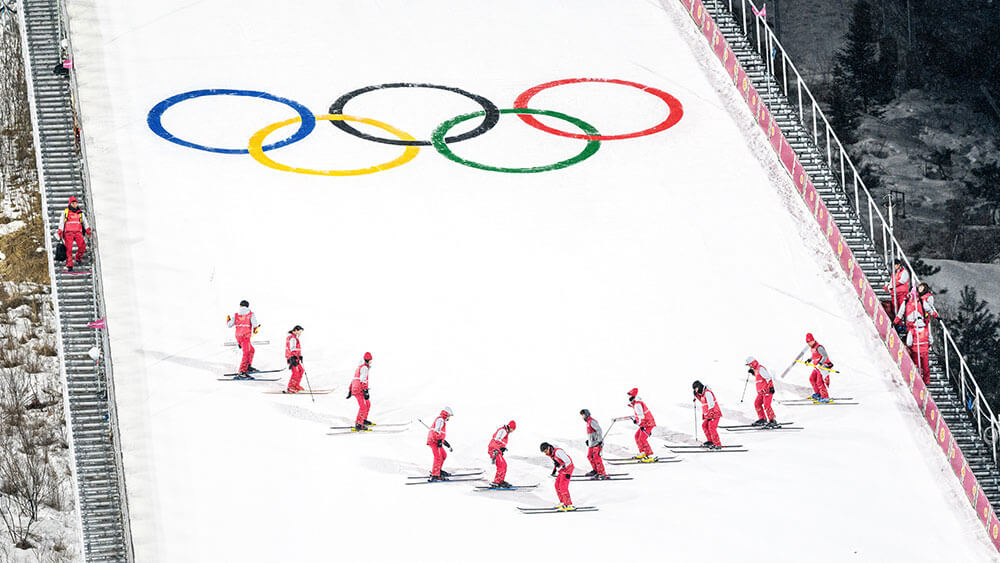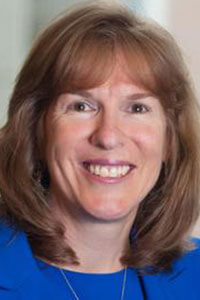
Volunteers ready the ski jump during the 2018 Winter Olympics in Pyeongchang, South Korea. The pandemic-related postponement of the 2020 Tokyo Games has given a George Washington University professor the opportunity to teach students who had planned to attend about crisis management for events. (Vytautas Dranginis on Unsplash)
The coronavirus pandemic may have knocked the entire business events industry off kilter, but for Lisa Delpy Neirotti, Ph.D., director of the Master of Science in Sport Management program at the George Washington University School of Business — and PCMA’s 2020 Visionary Award Educator Honoree — the crisis also has enriched her curriculum.

Lisa Delpy Neirotti
The new wave of virtual events brought on by COVID-19–related live-event cancellations has made participating in the events industry more accessible to her students than ever before, and a valuable learning tool, said Delpy Neirotti, whose department has been teaching online classes for 20 years. “There are so many events” to use as case studies these days, she said.
A professor of sport, event, and tourism management at the university for nearly 30 years, Delpy Neirotti makes suggestions to students on what face-to-face-turned-digital events they might be interested in attending — such as SportTechie’s State of the Industry conference, which was moved to digital in late March — and provides a checklist (at bottom) to help them evaluate how the event was translated for a digital experience. Her students are then required to analyze what an event’s virtual expo hall looks like, for example, how demonstrations at virtual booths are performed, how breakout sessions are handled, how speakers adapt content for a digital platform, and more.
For the immediate present, it represents “a crash course for our students on how to do virtual events” when they were not originally planned for that channel, she said. “We evaluate the event planner — did the organization work with speakers to adjust,” Delpy Neirotti said, “or did they really try to just translate what a normal conference would look like and put it online?”
In addition, her students evaluate different digital platforms, like 6Connex and Nex-Tech, to understand their varying capabilities. “SportTechie moved their conference online and used 6Connex, so you could ‘walk’ into a coffee break room,” she said, where people were introducing each other, and “’walk’ into an exhibit hall.”
Delpy Neirotti said she thinks that virtual events — when proactively planned instead of as a last-minute pivot — provide an opportunity for participants to make more connections than at face-to-face events.
For extra credit, Delpy Neirotti said students also can speak to an event planner who had to switch to digital “and walk through their decision-making process,” including how long it took and what factors were taken into consideration.
This summer, students will get to deep dive into what it takes to make major event decisions in a crisis when Delpy Neirotti hosts an online course on the 2020 Summer Olympics, which have now been moved to 2021. “I was supposed to take 28 students to Tokyo for the Olympic Games this summer, to work and study the Games,” she said, adding that she has taken students to the Olympic Games 16 times. Her course will include guest speakers from the International Olympic Committee, Tokyo 2020 Organizing Committee, U.S. Olympic Committee, corporate sponsors, athletes, media, and vendors who are now “in pivot mode,” she said.
“It will not be as exciting as being in Tokyo, but they will learn a lot about crisis management, decision making, contract negotiations, and being flexible.”
Casey Gale is an associate editor at Convene.
A Virtual Conference Evaluation Checklist
Delpy Neirotti asks students to look for the following when she assigns them the task of analyzing virtual conferences:
✔ Registration: Is it free, for a fee, or free with optional paid access?
✔ Communication: What are the messages pre-event, during the event, and post-event?
✔ Presentations: What kind and were they adapted to virtual? How long? Are they live vs. recorded?
✔ Interactivity: Was there a conversation vs. single voice during presentations?
✔ Digital staging for speakers and emcees: Was there a theme? Was it relevant? Was it distracting?
✔ Trade show: How are exhibitors displayed and found? How are demos viewed? How do you share contact information? Is there unique technology, like 3D or holograms?
✔ Coffee break or networking space: How does the chat function work and how are contacts shared?
✔ User-friendliness: Is moving from one space to another easy?
✔ Sponsor integration: Where do sponsors receive branding, display ads, giveaways, contests, and verbal recognition?
✔ Language translation: Is translation provided for international events?
✔ Accessibility: Are both mobile and desktop platforms accessible?
✔ Engagement features: Are there polls, pop-up reminders to visit exhibit halls, chats, or trivia throughout the event?
✔ Was there a silent auction or fundraiser?
✔ Social media: Are there opportunities for attendees to share on social media?
Earn CMP Credit
By reading this story and the others found in the May-June Convene cover story, you will be ready to earn one hour of CE credit toward CMP certification from the Events Industry Council. To learn more about how you can take an online test to earn that CE credit, visit Convene‘s CMP series page.
The Certified Meeting Professional (CMP) is a registered trademark of the Events Industry Council.
